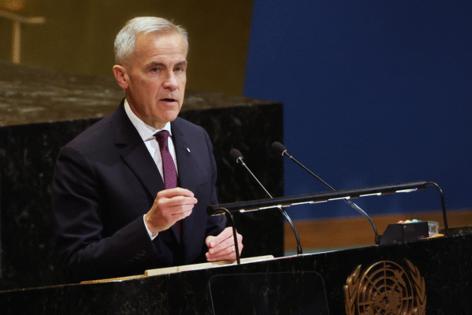Carney plots 'talent attraction' plan as US upends H-1B
Published in Business News
Canadian Prime Minister Mark Carney says his government’s upcoming budget will introduce an immigration plan that includes a talent attraction strategy.
Carney made the announcement in a speech Wednesday night, confirming an earlier report by Bloomberg News. The live prime-time address was unusual for a Canadian prime minister and aimed to lay out his economic vision for the country.
“To match immigration levels with our needs and our capacity, the budget will include Canada’s new immigration plan to do better — for newcomers, for everyone,” he said, adding it will also have a “talent strategy,” skills training and apprenticeships for scientists and innovators.
The prime minister has previously said he wants to attract employees from the technology sector who might have otherwise gone to the U.S. if not for President Donald Trump’s new visa charges.
Trump signed an executive order in September imposing $100,000 fees on new H-1B visas. The U.S. recently exempted some workers from paying the fee, but the move has still caused confusion and frustration for companies that rely on the program to bring in global talent in computer programming, engineering and other roles.
Carney’s government has maintained immigration curbs brought in by former Prime Minister Justin Trudeau, who restricted the flow of foreign students and temporary workers after the country’s population growth rate spiked to among the world’s fastest. The new leader faces a challenge in restoring public support for immigration, which has hit multi-decade lows.
Carney also said the budget would include Canada’s new “climate competitiveness strategy,” with a focus on “results over objectives, on investments over prohibition.”
Despite deep green credentials — including a five-year stint as United Nations special envoy for climate change — Carney has been noncommittal about meeting the federal government’s 2030 and 2035 emissions targets.
He’s also scrapped a number of environmental policies introduced by Trudeau and struck a friendlier tone on fossil fuel production. He’s fast-tracked approval for a liquefied natural gas export facility expansion in British Columbia, opened the door to the possibility of a new oil pipeline to the country’s west coast, and hasn’t ruled out abandoning plans for an emissions cap for oil and gas producers.
“We are an energy superpower,” he said in the speech, touting Canada holding the third-largest reserves of oil and the fourth-largest reserves of natural gas in the world, as well as its 85% clean electricity grid and vast deposits of critical minerals and rare earths.
Carney discussed his push for the federal government to “spend less to invest more,” which was a key theme of his election campaign. He plans to balance the operating budget in three years while deepening the deficit for capital investments.
He also highlighted his government’s efforts to reduce regulatory burdens and improve efficiency in the public service, including ways to “cut duplication and reduce costs.”
“Our government will work relentlessly to cut waste and drive efficiencies, and when we have to make difficult choices, we will be thoughtful, transparent and fair,” Carney said.
Finance Minister Francois-Philippe Champagne will release the budget Nov. 4, and economists surveyed by Bloomberg expect the deficit to surge to C$70 billion ($50 billion), with some saying the shortfall could reach C$100 billion.
“Our government has the fiscal capacity to act decisively,” Carney said.
Carney delivered his speech to university students, a decision that is important. Economists, business groups and some policymakers have signaled guarded support for using Canada’s fiscal room to boost the country’s weak investment and productivity.
But cost of living concerns, including housing affordability and elevated rent prices, are a major issue for Canadians — and especially for young people, who are also contending with high unemployment.
That makes one of Carney’s tasks reassuring Canadians that the added debt burden and proposed fiscal shift to more capital investments will ultimately trickle down to better economic outcomes and rising wages.
“It’s our country. It’s your future,” he said. “We will give it back to you.”
(With assistance from Danielle Bochove, Nojoud Al Mallees and Mario Baker Ramirez.)
©2025 Bloomberg L.P. Visit bloomberg.com. Distributed by Tribune Content Agency, LLC.












Comments